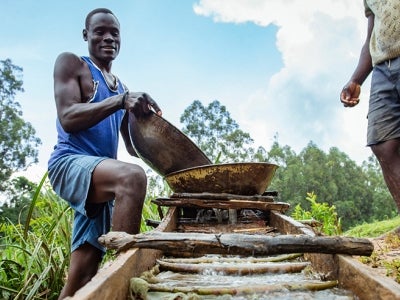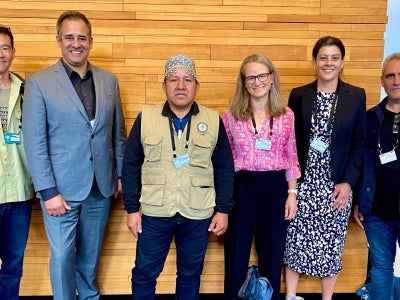
Gold mining is the main driver of forest loss and ecosystem degradation in Guyana. But not only are forests at risk, mercury is used in the gold mining process, further contaminating the environment and putting humans and other species’ health at risk.
In an effort to help combat the problem within this important sector of its economy, Guyana has launched a new effort to eliminate mercury use from small-scale artisanal gold mining.
The new project, backed by the Global Environment Facility and other partners including Conservation International and UN Environment, will assist Guyana with converting to mercury free mining by 2025. It plans to do this by involving business enterprises in the supply chain that will produce and market responsibly mined mercury-free gold from El Dorado.
“El Dorado” has a special significance in Guyana, which was central in the 1500s to the search for the fabled El Dorado city made entirely out of gold.
Guyana is the first of eight countries to launch a national project as part of the GEF funded GOLD – Global Opportunities for Long-term Development in the Artisanal Small Gold Mining Sector – program. The launch included participation by the Minister of Natural Resources of Guyana, the Head of Guyana’s EPA, the Guyana Geology and Mines Commission, the Gold and Diamond Miners’ Association, the Women Miners Organization, and representatives of local indigenous peoples.
Guyana is covered by rainforest on 85% of its territory. While remaining largely intact over the course of history, primarily due to a small population and low accessibility, in the last ten years Guyana’s rainforests have been increasingly exploited for gold mining. The growth in mining activities is largely due to a growing international demand for gold and high gold prices.
Through the GOLD program, the GEF will provide funds to eight countries with a sizable gold mining sector where many artisanal miners still rely on mercury for gold extraction. A GEF investment of $45 million is expected to attract more than $135 million in additional funding from government budget, international financing institutions, and private companies.
Conservation International will implement the project in Guyana with government, private sector, and other partners in the sector as part of an initiative to realize a responsible artisanal, small and medium scale gold mining sector. The other projects in the GOLD program will be implemented by UN Environment, UNDP, and UNIDO in Burkina Faso, Colombia, Indonesia, Kenya, Peru, Mongolia and the Philippines.
The establishment of the Minamata Convention on Mercury in 2013 was a milestone in the global fight against mercury pollution. The Guyana project is a bold step forward from the country in order to deliver on their commitment under the convention.


